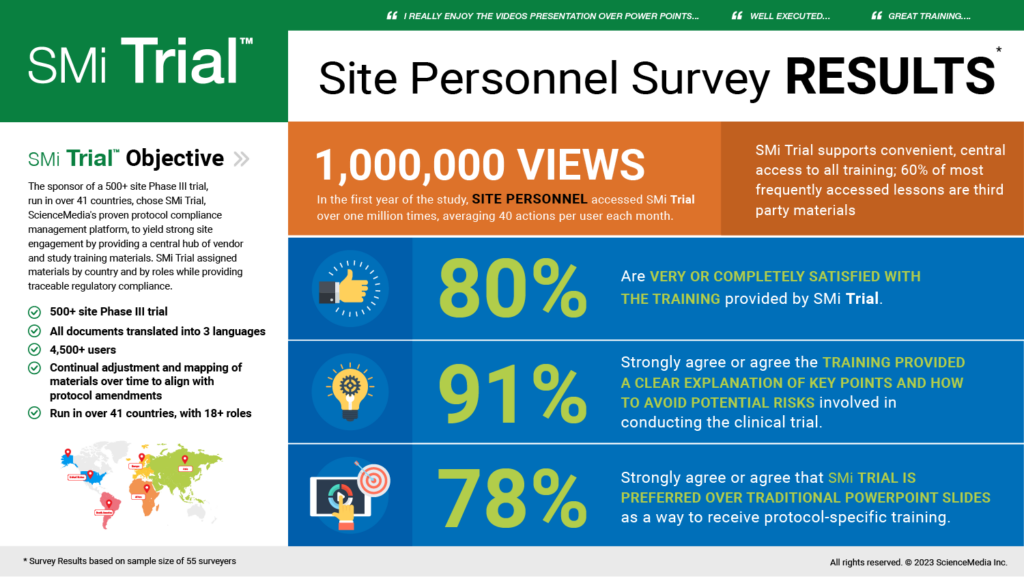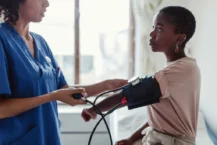

insights
Site and Patient-Centric Approach to Clinical Trial Training
Roche Doesn’t Treat Training as an Afterthought, So Why Are You?
Content in collaboration with ScienceMedia
Authors:
Mark Surles, CEO, ScienceMedia
Malachi Bierstein, Chief Commercial Officer, ScienceMedia
The clinical research community is continually called to modernize its approach to clinical trials. More recently, this push is attributed to the passing of the Food and Drug Omnibus Reform Act (FDORA), intended to reshape clinical trial design and operations. Modernization, under FDORA, covers many components, including diversity in clinical trials, the growth of decentralized trials, and streamlining clinical operations – all key outcomes needed in modern clinical research.
One company has been discussing the need to modernize and streamline industry operations for quite some time, particularly around clinical trial protocol training. ScienceMedia has been sharing their site and patient-centric training approach – and why our industry needs widespread change – for years during Halloran Consulting Group’s Clinical Operations Retreat for Executives (CORE).
Though CORE is designed to be off-the-record, we are taking key takeaways from the panel, “Completing the Study Delivery Puzzle: How Roche Raised their Game with Protocol Compliance and Study-Specific Training and Patient Centricity,” led by Mark Surles, CEO of ScienceMedia, and Malachi Bierstein, Chief Commercial Officer, along with Monica Eason, Global Clinical Operations Portfolio Leader at Roche, and building on those insights so you, too, may take practical insights back to your organizations.
What does it look like to have a modern approach to clinical trial protocol training?
Modernization. We are in it together.
Modernizing Clinical Trial Protocol Training
ScienceMedia’s SMi Trial solution is already modern because the content and delivery account for the growing complexity of clinical operations. This risk-based training solution is far from the common site training practice, which is often a single PowerPoint presentation followed by a bolt-on learning session. The issue with this approach is it’s often an afterthought and doesn’t accommodate the site and patient experience throughout the lifecycle of a trial. This leads to misunderstandings, deviations, and patient enrollment and retention issues.
While the clinical research industry is making progress and many sponsors are taking steps in improving their training processes, in large, the same ineffective training approach is still the norm.
SMi Trial is a protocol compliance and risk-based training solution, offering short multimedia training modules with built-in knowledge checks for increased retention to address stakeholder preferences. This approach is fit for sites, patients, and service providers.
We’ve observed, especially during the COVID-19 pandemic, that modernizing approaches requires change management and the courage to do something differently, especially when pockets of industry may be resistant to change. As leaders and innovators in the industry, it’s critical to learn and adopt innovative approaches to continue to improve clinical operations, elevate the patient experience, and ultimately, reduce the risk of errors that matter in a clinical trial protocol. This message, shared by ScienceMedia, resonated with attendees at the retreat.
How may leaders bring this insight back to their organizations to incite change? Leading with influence matters, and gaining influence is at the center of proper communication. If you’re wondering, ‘where do I start within my organization?’ begin identifying the right stakeholders to hear your positioning on how adoption of a modern training approach will enhance operations, improve inefficiencies, and produce better clinical outcomes.
What feedback have you gathered from your sites, and what data do you have that elevates a call to modernize? The answers to those questions will likely provide a robust discussion with those in your organization that need to hear it most.
Building Site and Patient Trust through ScienceMedia’s SMi Trial
Site-Facing Training and Communication
If you’ve been able to make the case for change management and are on your way, you’re already ahead of the curve. If you have a new training approach ready to implement with your site, it’s important to be aware of the many elements that influence a site’s choice to accept a clinical study. Sponsors may influence site choices by creating a positive sponsor-site relationship from the onset by sharing decisions that alleviate common operational challenges and reduce the burden for site staff.
Training site staff on a clinical trial protocol is often a challenge, especially with today’s modernization of clinical trials. Whether you’re working with a new site or one where you’ve had a standing relationship, allow for adequate time to plan and prepare the training rollout with the site staff. This is one way to reduce (or remove) an operational challenge. An adequate runway prepares the sponsor to deploy a mindful training approach and prepares staff with the trial insight before patient recruitment even begins. Reducing training burden and repetition can be accomplished through tools like SMi Trial because shortened training modules focus on what is important, timely (per the protocol), and hands-on.
SMi Trial also enables site compliance throughout the entire lifecycle of the trial; it’s observed that numerous, shortened training modules throughout the lifecycle of the trial enables site education and compliance, and reduces burden. Ultimately, this training approach builds trust with the site and strengthens a sponsor-site relationship.
Patient-Facing Training and Communication
Health literacy, potential biases, and cultural and language barriers all play into your patient communication approach. Then, determine how you may leverage education in small, frequent doses to enable trust from the onset and maintained throughout the lifecycle of the trial.
Joining a clinical study is a big decision for any patient, and it’s essential to clearly communicate expectations (and anticipated experience) to patients from the beginning. ScienceMedia’s sample “About The Study” video from SMi Trial provides an example of a short, informational video to be shared with patients about their anticipated experience before enrolling in the trial.
This video helps cultivate patient confidence, trust, and willingness to participate because it breaks down the details of the trial. Informational videos, such as these, set the framework for the patient experience, highlight their contribution in the study, provide information on benefits and risks, and inform on expectations without overwhelming patients.
Why Roche Didn’t Treat Training as an Afterthought
Roche, a prominent top-five global pharmaceutical company and industry leader in innovation, approached ScienceMedia with a fundamental understanding that sites are deeply selective on the studies and sponsors they will support. Knowing this, they understood their global clinical trial protocol complexities required clear training instructions and tutorials to offer an effective experience with their site.
In order to drive better study delivery that impacts data, quality, risk, deviations, and site engagement, Roche needed a way to modernize their protocol training and move away from paper packets and PowerPoints to make their training more sophisticated. They needed a multi-format approach to ensure global compliance for their clinical study, and though the trial is still ongoing, they are set to drive further success with SMi Trial as their company’s policies allow.
The image below captures Roche’s results with SMi Trial.

© ScienceMedia 2023. SMi Trial usage results.
Conclusion
Though Roche conducts global studies, this type of clinical trial training is still valuable and relevant to smaller sponsors and trials. Training issues exist on all study levels due to the sizable details site staff manage throughout the lifecycle of a trial, not to mention site staff turnover.
SMi Trial enables sponsors, and even Clinical Research Organizations (CROs), to transition to online clinical trial management by facilitating global communication with sites, circulating protocol training and study updates, and deploying comprehension assessments to identify high-risk areas of trials without requiring on-site visits.
As more sponsors adopt this training approach, the clinical research community takes more collective steps towards the modernization of clinical trial training. As sponsors, you’ll also build the case to become a sponsor of choice.
About ScienceMedia
ScienceMedia delivers science and medical training that will engage employees and set them up for success. Their mission is to provide on-the-job clinical competency by teaching complex science in easier ways to life science organizations. SMi Trial – a protocol compliance and risk-based training solution – mitigates clinical risk and decreases trial costs by optimizing study compliance throughout the lifetime of a clinical trial.
Their just-in-time therapeutic and protocol training, risk-based assessments, and real-time analytics serve to elevate clinical competency, improve the power of clinical data, and ensure patient safety. To combat Clinical Research Associate (CRA) turnover, and elevate subject area knowledge, SMi Source also provides a mobile-enabled, on-demand microlearning platform built by PhDs, with 300+ full courses covering more than 360 hours of content spanning from a disease state, therapeutic area, and science-related topics.
For additional information about how ScienceMedia’s protocol compliance management solution can benefit your trial, follow their LinkedIn and blog.
About CORE
CORE, a Clinical Operations Retreat for Executives produced by Halloran Consulting Group, was launched in 2004 on the east coast of Massachusetts and has since expanded to the west coast in California. CORE brings together an exclusive group of senior leaders in clinical development to discuss and debate the most pressing issues around the business of product development and building enduring companies in this space.
What to learn more about CORE? Contact us today.




